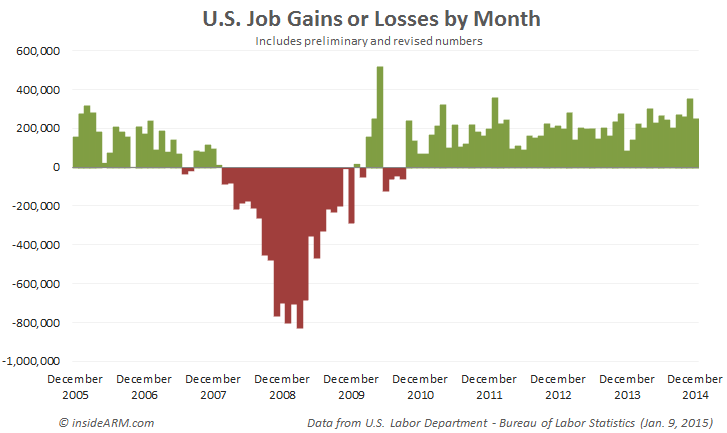Just over a quarter million jobs were added to the American economy in December 2014 as the official unemployment rate dipped to 5.6 percent, the lowest reading since June 2008. While the gains were broad-based and slightly higher than expectations, wages unexpectedly dipped in the month for the first time this year.
A total of 252,000 new jobs were created in December according to the monthly survey of employers conducted by the Labor Department. In addition, the initial job gain numbers from October and November were revised upward by a total of 50,000.
The fourth quarter of 2014 was the strongest quarter for job growth since Q1 2006. An average of 289,000 jobs were created each month in the final quarter of 2014.
For the full year, the U.S. economy saw an average of 246,000 jobs added each month. A total of 2.95 million jobs were created in the year, the best single year since 1999 when slowing job growth from the dot com boom was offset by IT hiring in anticipation of Y2K. Close to 3.2 million jobs were created that year.
 In December, job gains were seen across most industries. Employment in professional and business services rose by 52,000, construction added 48,000 jobs, employment in food services and drinking places was up 44,000, healthcare added 34,000 jobs, and manufacturing jobs increased by 17,000.
In December, job gains were seen across most industries. Employment in professional and business services rose by 52,000, construction added 48,000 jobs, employment in food services and drinking places was up 44,000, healthcare added 34,000 jobs, and manufacturing jobs increased by 17,000.
Employment in retail trade changed little in December, following a large gain in November. Employment in other major industries, including mining and logging, transportation and warehousing, information, and government, changed little in December.
But the news was not all good. The average workweek for all employees was unchanged at 34.6 hours in December while average hourly earnings decreased by 5 cents to $24.57. Hourly earnings had increased by 6 cents in November, but the decline in December pushed average wage grow for the year to 1.7 percent, very near the rate of inflation.
Stagnant or very slow wage growth may start hitting ARM companies as they try to collect from debtors. While more people have jobs, their wages are barely keeping up with the price of necessities, which could trigger lower collection rates.




![[Image by creator from ]](/media/images/patrick-lunsford.2e16d0ba.fill-500x500.jpg)


![[Image by creator from ]](/media/images/New_site_WPWebinar_covers_800_x_800_px.max-80x80.png)
![[Image by creator from ]](/media/images/Finvi_Tech_Trends_Whitepaper.max-80x80.png)
![[Image by creator from ]](/media/images/Collections_Staffing_Full_Cover_Thumbnail.max-80x80.jpg)
![Report cover reads One Conversation Multiple Channels AI-powered Multichannel Outreach from Skit.ai [Image by creator from ]](/media/images/Skit.ai_Landing_Page__Whitepaper_.max-80x80.png)
![Report cover reads Bad Debt Rising New ebook Finvi [Image by creator from ]](/media/images/Finvi_Bad_Debt_Rising_WP.max-80x80.png)
![Report cover reads Seizing the Opportunity in Uncertain Times: The Third-Party Collections Industry in 2023 by TransUnion, prepared by datos insights [Image by creator from ]](/media/images/TU_Survey_Report_12-23_Cover.max-80x80.png)
![Webinar graphic reads RA Compliance Corner - Managing the Mental Strain of Compliance 12-4-24 2pm ET [Image by creator from ]](/media/images/12.4.24_RA_Webinar_Landing_Page.max-80x80.png)